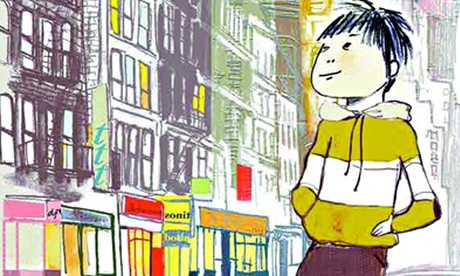
The idea of wordless picture books might seem slightly baffling – even a waste of time – to adults keen to draw children higher up the literacy ladder. But the best just-picture books require a deeper, more intent commitment from the adult who shares them than the well-worn story whose words patter from grown-up lips without pause for thought. For me, leafing through a wordless or near–wordless book in the company of a curious child prevents my mind detaching and wandering off to check the stove. Perverse as it seems, the fewer words, the more entirely present I am as reader.
Children, too, are adept at spotting the nuances of meaning in wordless books; often more so than adults, since they’re accustomed to transporting themselves deep into the small worlds opened up by a picture book’s panels. The playing field is not simply levelled – it now favours the sharp-eyed and imaginative spinner of wild yarns, meaning the pre-literate child will usually win over their word-bound elders. Just-picture books also welcome children who struggle with reading, or find it boring or intimidating. What draws me to them most strongly, though, are the subtleties of emotion that words can’t capture simply enough for a child to understand, but that images can, and do.
Here I Am by Patti Kim and Sonia Sanchez, which will be published here by Curious Fox in February, is a brilliant evocation of a boy’s confusion and fear as he leaves his old home and settles in the bewildering new environment of New York. From the first page, in which we see him peering glumly from an aircraft window down at the darkly bustling city, then passing airport signs which spell out strident gibberish, we share his sense of profound alienation. His resolutely smiling parents can’t make a dent in his depression; nothing does, until he drops the cherished red seed he’s brought with him as a talisman from home, and is obliged to go out into his baffling, colourful new world to retrieve it, making friends, and sense of the city, as he does so. Like Shaun Tan’s The Arrival , Here I Am does a superlative job of conveying the immigrant’s yearning to belong, to shuffle together the new and old cards of identity into a coherent pack. The three words of the title on the last page, floating above the boy’s reflection in a pool of Monet-green water, are both an affirmation and a satisfying full stop.
Aaron Becker’s Caldecott-winner Journey is another silent beauty, in which a bored, lonely little girl draws a doorway on her bedroom wall and emerges into a lantern-lit forest; then she draws a boat and sails down a river into a soaring city, full of playful steampunk touches and intricately imagined architecture. But it’s not the tense storyline, in which she must rescue a purple bird from an evil emperor, that grips the reader closest – although the plot is taut and well-conceived – it’s the tender, subtle touches which evoke her emotions, unique but instantly recognisable, on every page of the book.
Magical companions pair especially well with wordless picture books – this is a theme that won’t date, so long as children invent adventures and comrades-in-adventure for themselves. I loved Raymond Briggs’s The Snowman as a child; 30 years later, the copy in my daughter’s school library is worn to tatters, and only rarely seen on the shelf. Briggs’s wordless gift is in the everyday detail of dressing gown, slippers and clothes-horse, which makes the intrusion of the extraordinary – the snowman turning to greet the boy, the impossible leap into the cold air – somehow well-earned, and still more breathtaking.
Just-picture books can also be dryly hilarious and full of challenge. I thought my pre-literate daughter would be baffled by David Wiesner’s near-wordless Mr Wuffles! – a miniature epic about a spoilt cat who rejects his owner’s toys in favour of war with the ants and ladybirds inhabiting the crannies of his home. When a tiny spaceship crash-lands there, however, Mr Wuffles is tail-flickingly delighted to pursue the aliens instead. The aliens’ alliance with the ants, their ladybird-borne flight, the curious languages – dots for the ants, triangles for the aliens – in which they speak, and the ultimate escape of the spaceship, has enraptured both of us. It’s fetched out again and again, with both of us making new discoveries every time.
The biggest ideas, too, are sometimes best conveyed in the fewest words. Jeannie Baker’s Window uses a single framing image throughout: a window on to a wilderness, with a mother and baby looking out of it. The view changes as the birthday cards on the windowsill chart the child’s age, moving towards adulthood – and the wilderness changes, little by little, to developed land, until the grown child moves to a new home and a new window with his own baby, to look out on a new wilderness. But there is already a shiny city encroaching on the corner of this one, and a sign reading “House Blocks for Sale”. A gentle, but urgent reminder, rather than a strident harangue, this endlessly absorbing book guides the reader to remember that small, apparently benevolent actions can coalesce, all of a sudden, into huge ineradicable change.
What other brilliant wordless books have I missed? Which do you remember most clearly, or which new ones have you shared with a child?

